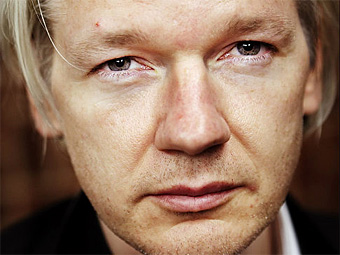
|  |  |  Americas & Beyond Americas & Beyond  
WikiLeaks' Julian Assange Arrested in London on Rape Charges
 Arthur Bright - Christian Science Monitor Arthur Bright - Christian Science Monitor
go to original
December 07, 2010

Related article: WikiLeaks Chief Julian Assange Denied Bail After Arrest in England for Rape Charge in Sweden


| | Julian Assange |  |
Julian Assange, editor in chief of WikiLeaks, was arrested Tuesday morning in London on rape charges from Sweden, adding a new wrinkle to the ongoing furor over WikiLeaks' controversial release of hundreds of thousands of US diplomatic cables.

The British Press Association reports that Mr. Assange is expected to appear in court Tuesday after being arrested by Scotland Yard's extradition unit at 9:30 a.m., according to a Metropolitan Police spokesman. The spokesman said that Assange voluntarily came to the London police station, where he was arrested on a European Arrest Warrant from Swedish authorities for "one count of unlawful coercion, two counts of sexual molestation and one count of rape, all alleged to have been committed in August 2010." The Press Association noted that the Metropolitan Police received an arrest warrant last month on the same charges, but the warrant was invalid because it was not properly filled out.

Sky News reports that Assange will probably be released on bail of between £100,000 and £200,000 (between $150,000 and $320,000), though it seems unlikely that Assange would attempt to flee, as he denies all the charges against him.

Assange's arrest comes despite his apparent threat last Friday that if anything "happens" to him or WikiLeaks, key portions of the WikiLeaks cable archive (only a small percentage of which has been published) would go public. In a Q&A with the public on the Guardian's website, Assange wrote that the cable archive "has been spread, along with significant material from the US and other countries to over 100,000 people in encrypted form. If anything happens to us, the key parts will be released automatically. Further, the Cable Gate archives is in the hands of multiple news organisations." The archive is known to already be in the hands of five news organizations around the world, including the Guardian and The New York Times.

The Associated Press reports that WikiLeaks called Assange's arrest an attack on the freedom of the press, but said that it would not affect the organization's ability to release more documents. "This will not change our operation," WikiLeaks spokesman Kristinn Hrafnsson said.

Although Assange was arrested on charges unrelated to the release of the US diplomatic cables, his detention could increase the likelihood of US legal action against him. The New York Times reports that on Monday, US Attorney General Eric Holder said that he had "authorized just last week a number of things to be done so that we can hopefully get to the bottom of this and hold people accountable." Although Mr. Holder declined to be more specific, he did say that the US government was continuing "a very serious, active, ongoing investigation that is criminal in nature" over the WikiLeaks cables' release.

The latest WikiLeaks revelations are of particular concern to the US government. The Guardian reported Tuesday that US cables revealed that NATO has developed plans to protect Poland and the Baltic states of Estonia, Latvia, and Lithuania from potential Russian threats, though the "contingency" plans had been kept secret to avoid "unnecessary tensions" with Moscow. And on Sunday, WikiLeaks released a February 2009 cable that listed "critical infrastructure" around the globe that "if destroyed, disrupted or exploited, would likely have an immediate and deleterious effect on the United States." The Christian Science Monitor reports that some have called the list of sites a "menu for terrorists," though others note that the sites' importance is largely already public knowledge.
|

 |
|  |



